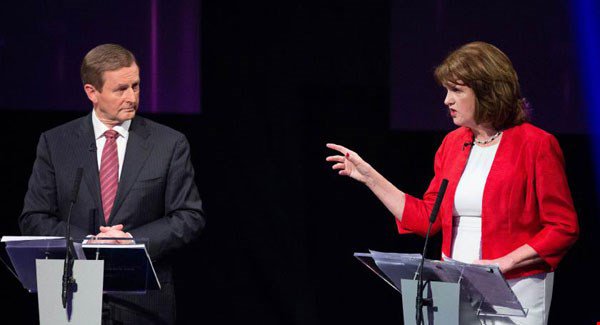Parochial politics, gender quotas and a lack of engagement with higher education were all identified as troublesome aspects of the Irish political system in a public lecture last night, which analysed the approaching general election.
The talk, hosted by the School of Social Sciences and Philosophy, offered a critique of content of the election campaign so far, eight days from polling day, as well as making predictions as to the potential results and composition of the 32nd Dáil.
Ed Mulhall, former Managing Director of News and Current Affairs at RTÉ, chaired the event, stating that the discussion represented a “an attempt to bring some of the professionalism and scholarship available in Trinity to bear on the issues that are there”.
Dr Michael King, of the Department of Economics, was the first member of the panel to give his address, with an explanation of the nature and extent of the “fiscal space”, something has come to dominate the economic rhetoric of the election campaign so far.
He revealed that the in-vogue election catchphrase has its origins in the limits imposed on Irish exchequer spending by the European Fiscal Stability Treaty, and was in essence “the total scope for spending and tax cuts for the term of the next Dáil”.
While putting the net fiscal space at a figure of about €3.2 billion, King advocated for economic prudence to tackle election-focused policies. He argued that politicians “tend to go about increasing spending before an election and then rolling it back afterwards, even in industrial economies like Ireland”.
Referencing the ageing Irish population, King argued that the present economic prosperity should be used “to repay debt or to save for the ageing of the population or for future fluctuations in the business cycles”. He regarded the debate over the “fiscal space” as not only about a conflict between different groups within society but rather as “a conflict between the needs of people today and the very real needs of people in twenty years time”.
Prof Richard Layte, of the Department of Sociology, offered his assessment of healthcare policy in Ireland, noting that “what you find is that health is consistently among people’s top three concerns when they decide how to vote”. Describing the present system of healthcare in Ireland, Layte observed “an increase in the proportion of healthcare that’s financed by private payments and health insurance”, a system unique in the world where “people buy insurance specifically to get access to hospitals more quickly”.
Layte ultimately saw the necessity for change in the “current two-tier health system”, suggesting that “it is already pretty broken and needs to be fixed”. In advocating moves towards universal healthcare that would be free at the point of delivery, he noted that there would be great difficulty in finding the political will for reform. “The decisions aren’t going to be popular but politicians are going to have to show leadership if the system is to be changed.”
Prof Michael Marsh, of the Department of Political Science, presented his predictions for the upcoming election through his aggregation of the various sets of polling data available. His “poll of polls” revealed a likely distribution of seats that might be set to emerge following the election, leaving no clear majority for any potential coalition.
Marsh’s analysis also brought to light intriguing quirks of Irish electoral politics, such as the tendency of the Labour Party to win seats more proportionally, given their share of the vote, than any other party. His appraisal of the the behaviour of Irish voters was less than positive. “In general, Irish elections are not about clarity of issues”, he noted.
Responding to a question from The University Times, Marsh added that “finding evidence of issue-based voting is very difficult”, even when age and and geographical area were taken into account.
Gail McElroy also weighed in on the local focus of Irish politics, interpreting survey results from the last election to reveal that the fault lies to a certain extent with a parochial-minded electorate. She said: “TDs are responding to what voters want.”
An engaging and insightful address on the representation of women in the Dáil was given by Head of the School of Social Sciences and Philosophy, Prof Gail McElroy, from the Department of Political Science. With a barrage of international evidence, McElroy revealed the root causes of the meagre representation of women in the 31st Dáil, amounting to only 16 TDs.
The crux of the problem is an unfavourable self-appraisal among potential female candidates, who are less likely to regard themselves as fit for office compared to similarly qualified men. “There seems to be this confidence gap or self-perception that’s keeping women out of the running”. Somewhat reassuringly, the electorate don’t seem to be to blame. “There’s no evidence that voters systematically vote against women,” McElroy observed, “They’re actually quite gender blind”.
McElroy also made a powerful case for an increased prevalence of women in Leinster House: “We find that women are more legislatively entrepreneurial, they sponsor more bills, they bring more money back to their constituencies.” Rigorous analysis of every single speech made during the last Dáil term, revealed that “women on average gave more speeches on health, education and welfare” than their male counterparts.
While predicting some increase in the representation of women in light of the gender quotas, which require all political parties to present women as 30 per cent of their candidates, she predicts that the female cohort in the Dáil still won’t exceed 37 TDs.
In response to questions presented by members of the audience, a consensus emerged among the panellists that the election campaign has had a relatively narrow focus. Michael King regarded the election as one about “what you spend on A,B and C, but very little detail on how you’re going to change things”.
Gail McElroy also suggested that certain key issues were absent from the campaign, noting that a “missing issue is higher education”.







